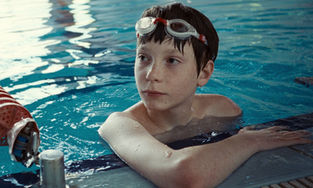'Dear Edward' Season 1 Review: One Sole Plane Crash Survivor Sulks In Mournful Apple TV+ Drama
- S.J.

- Feb 2, 2023
- 3 min read
Updated: Aug 12, 2024

Tears and exposed emotions are constantly just one conversation away in Dear Edward, a drama series adaptation of Ann Napolitano's tearjerker novel of the same name. In this first season, we meet an ensemble of poor unfortunate souls including title character Edward (Colin O'Brien), a 12-year-old boy who miraculously survives a plane crash from New York to Los Angeles in which every other person, such as his whole family, dies. As Edward begins dealing with his trauma and survivor guilt, he moves in with his aunt Lacey (Taylor Schilling) and her husband John (Carter Hudson), also connecting with Shay (Eva Ariel Binder), a girl of similar age living next door.
Lacey on the other hand explores her loss of her sister in a grief group with others who lost someone on that flight; rich and privileged Dede (Connie Britton), political candidate Adriana (Anna Uzele), Ghanaian entrepreneur Kojo (Idris Debrand), piano repairer Amanda (Brittany S. Hall), pregnant young woman Linda (Amy Forsyth) and Sam (Dario Ladani Sanchez).
First thing that immediately jumps out with Dear Edward is that it's certainly gunning for an award for Most Writing, headlined by showrunner Jason Katims' contributions which come with both high and low altitudes. First episode is an example of the latter, slogging massively as it tries to balance characters with little care, resulting in one of the worst pilots (no pun intended) of all time. That episode and other weaker ones like the last two suffer because of word vomit; every single thought and emotion is rendered with exposition and lousy understanding of time and place which characters inhabit.
The real miracle is how episode two manages to dig the show out of its own grave as writing finally meets actors halfway. It focuses on tension that O'Brien, Schilling must express or their characters get suffocated by their sorrow. Writers' attempt to explore mortality and survival is sincere enough to carry a few episodes and actors often give it their all, highlights being Debrand and Britton who expertly control both joy and melancholy that humans possess even when they're at their lowest.
Mainly the cause for the show's eventual downfall is the fixation on Katims and rest's word vomit which gives no room for anyone to visualise it. TV is a visual medium first and foremost and there's usually nothing in the images that reflect the material. Directors like Fisher Stevens and Nisha Ganatra seem to be stuck in a box where characters' actions are constantly unnatural, as are their conversations, fights and reactions. This lifelessness also echoes to cinematography (David Boyd, Tim Bellen) which is telling a different story than the acting. Perfect illustrations are the season's first and final shots that sound okay in a first draft of a script but are really unimaginative when brought to life.
Katims and his music team, led by composer Jonathan Sanford, then try their hardest to overcompensate with the soundtrack—you won't want to hear acoustic guitar for months after this season—with plenty of sappy singer-songwriter tunes combined with piano tinkles by Sanford. It's almost begging viewers to tear up which works when the aforementioned sincerity works as well but gets on your nerves because it's an overlong, overstuffed season of dramatics. The writers apparently decided to adapt a lot of the novel in case there's no second season which, yes, is fair in this climate of ''peak TV'', but sometimes too many letters is simply just too many.
Smileys: Characterisation, tone
Frowneys: Directing, cinematography, dialogue
Gerard Butler wouldn't have let this happen.










